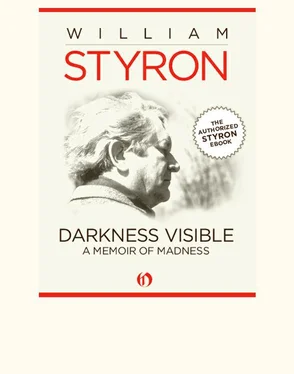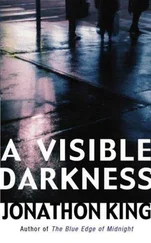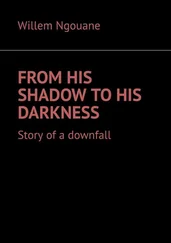William Styron - Darkness Visible
Здесь есть возможность читать онлайн «William Styron - Darkness Visible» весь текст электронной книги совершенно бесплатно (целиком полную версию без сокращений). В некоторых случаях можно слушать аудио, скачать через торрент в формате fb2 и присутствует краткое содержание. Город: New York, Год выпуска: 2010, ISBN: 2010, Издательство: Open Road Integrated Media, Жанр: Биографии и Мемуары, Психология, на английском языке. Описание произведения, (предисловие) а так же отзывы посетителей доступны на портале библиотеки ЛибКат.
- Название:Darkness Visible
- Автор:
- Издательство:Open Road Integrated Media
- Жанр:
- Год:2010
- Город:New York
- ISBN:978-1-936317-29-5
- Рейтинг книги:5 / 5. Голосов: 1
-
Избранное:Добавить в избранное
- Отзывы:
-
Ваша оценка:
- 100
- 1
- 2
- 3
- 4
- 5
Darkness Visible: краткое содержание, описание и аннотация
Предлагаем к чтению аннотацию, описание, краткое содержание или предисловие (зависит от того, что написал сам автор книги «Darkness Visible»). Если вы не нашли необходимую информацию о книге — напишите в комментариях, мы постараемся отыскать её.
Darkness Visible — читать онлайн бесплатно полную книгу (весь текст) целиком
Ниже представлен текст книги, разбитый по страницам. Система сохранения места последней прочитанной страницы, позволяет с удобством читать онлайн бесплатно книгу «Darkness Visible», без необходимости каждый раз заново искать на чём Вы остановились. Поставьте закладку, и сможете в любой момент перейти на страницу, на которой закончили чтение.
Интервал:
Закладка:
The disappointment I always felt at never meeting Camus was compounded by that failure having been such a near miss. I had planned to see him in 1960, when I was traveling to France and had been told in a letter by the writer Romain Gary that he was going to arrange a dinner in Paris where I would meet Camus. The enormously gifted Gary, whom I knew slightly at the time and who later became a cherished friend, had informed me that Camus, whom he saw frequently, had read my Un Lit de Ténèbres and had admired it; I was of course greatly flattered and felt that a get-together would be a splendid happening. But before I arrived in France there came the appalling news: Camus had been in an automobile crash, and was dead at the cruelly young age of forty-six. I have almost never felt so intensely the loss of someone I didn’t know. I pondered his death endlessly. Although Camus had not been driving he supposedly knew the driver, who was the son of his publisher, to be a speed demon; so there was an element of recklessness in the accident that bore overtones of the near-suicidal, at least of a death flirtation, and it was inevitable that conjectures concerning the event should revert back to the theme of suicide in the writer’s work. One of the century’s most famous intellectual pronouncements comes at the beginning of The Myth of Sisyphus: “There is but one truly serious philosophical problem, and that is suicide. Judging whether life is or is not worth living amounts to answering the fundamental question of philosophy.” Reading this for the first time I was puzzled and continued to be throughout much of the essay, since despite the work’s persuasive logic and eloquence there was a lot that eluded me, and I always came back to grapple vainly with the initial hypothesis, unable to deal with the premise that anyone should come close to wishing to kill himself in the first place. A later short novel, The Fall, I admired with reservations; the guilt and self-condemnation of the lawyer-narrator, gloomily spinning out his monologue in an Amsterdam bar, seemed a touch clamorous and excessive, but at the time of my reading I was unable to perceive that the lawyer was behaving very much like a man in the throes of clinical depression. Such was my innocence of the very existence of this disease.
Camus, Romain told me, occasionally hinted at his own deep despondency and had spoken of suicide. Sometimes he spoke in jest, but the jest had the quality of sour wine, upsetting Romain. Yet apparently he made no attempts and so perhaps it was not coincidental that, despite its abiding tone of melancholy, a sense of the triumph of life over death is at the core of The Myth of Sisyphus with its austere message: in the absence of hope we must still struggle to survive, and so we do—by the skin of our teeth. It was only after the passing of some years that it seemed credible to me that Camus’s statement about suicide, and his general preoccupation with the subject, might have sprung at least as strongly from some persistent disturbance of mood as from his concerns with ethics and epistemology. Gary again discussed at length his assumptions about Camus’s depression during August of 1978, when I had lent him my guest cottage in Connecticut, and I came down from my summer home on Martha’s Vineyard to pay him a weekend visit. As we talked I felt that some of Romain’s suppositions about the seriousness of Camus’s recurring despair gained weight from the fact that he, too, had begun to suffer from depression, and he freely admitted as much. It was not incapacitating, he insisted, and he had it under control, but he felt it from time to time, this leaden and poisonous mood the color of verdigris, so incongruous in the midst of the lush New England summer. A Russian Jew born in Lithuania, Romain had always seemed possessed of an Eastern European melancholy, so it was hard to tell the difference. Nonetheless, he was hurting. He said that he was able to perceive a flicker of the desperate state of mind which had been described to him by Camus.
Gary’s situation was hardly lightened by the presence of Jean Seberg, his Iowa-born actress wife, from whom he had been divorced and, I thought, long estranged. I learned that she was there because their son, Diego, was at a nearby tennis camp. Their presumed estrangement made me surprised to see her living with Romain, surprised too—no, shocked and saddened—by her appearance: all her once fragile and luminous blond beauty had disappeared into a puffy mask. She moved like a sleepwalker, said little, and had the blank gaze of someone tranquilized (or drugged, or both) nearly to the point of catalepsy. I understood how devoted they still were, and was touched by his solicitude, both tender and paternal. Romain told me that Jean was being treated for the disorder that afflicted him, and mentioned something about antidepressant medications, but none of this registered very strongly, and also meant little. This memory of my relative indifference is important because such indifference demonstrates powerfully the outsider’s inability to grasp the essence of the illness. Camus’s depression and now Romain Gary’s—and certainly Jean’s—were abstract ailments to me, in spite of my sympathy, and I hadn’t an inkling of its true contours or the nature of the pain so many victims experience as the mind continues in its insidious meltdown.
In Paris that October night I knew that I, too, was in the process of meltdown. And on the way to the hotel in the car I had a clear revelation. A disruption of the circadian cycle—the metabolic and glandular rhythms that are central to our workaday life—seems to be involved in many, if not most, cases of depression; this is why brutal insomnia so often occurs and is most likely why each day’s pattern of distress exhibits fairly predictable alternating periods of intensity and relief. The evening’s relief for me—an incomplete but noticeable letup, like the change from a torrential downpour to a steady shower—came in the hours after dinnertime and before midnight, when the pain lifted a little and my mind would become lucid enough to focus on matters beyond the immediate upheaval convulsing my system. Naturally I looked forward to this period, for sometimes I felt close to being reasonably sane, and that night in the car I was aware of a semblance of clarity returning, along with the ability to think rational thoughts. Having been able to reminisce about Camus and Romain Gary, however, I found that my continuing thoughts were not very consoling.
The memory of Jean Seberg gripped me with sadness. A little over a year after our encounter in Connecticut she took an overdose of pills and was found dead in a car parked in a cul-de-sac off a Paris avenue, where her body had lain for many days. The following year I sat with Romain at the Brasserie Lipp during a long lunch while he told me that, despite their difficulties, his loss of Jean had so deepened his depression that from time to time he had been rendered nearly helpless. But even then I was unable to comprehend the nature of his anguish. I remembered that his hands trembled and, though he could hardly be called superannuated—he was in his mid-sixties—his voice had the wheezy sound of very old age that I now realized was, or could be, the voice of depression; in the vortex of my severest pain I had begun to develop that ancient voice myself. I never saw Romain again. Claude Gallimard, Françoise’s father, had recollected to me how, in 1980, only a few hours after another lunch where the talk between the two old friends had been composed and casual, even lighthearted, certainly anything but somber, Romain Gary—twice winner of the Prix Goncourt (one of these awards pseudonymous, the result of his having gleefully tricked the critics), hero of the Republic, valorous recipient of the Croix de Guerre, diplomat, bon vivant, womanizer par excellence—went home to his apartment on the rue du Bac and put a bullet through his brain.
Читать дальшеИнтервал:
Закладка:
Похожие книги на «Darkness Visible»
Представляем Вашему вниманию похожие книги на «Darkness Visible» списком для выбора. Мы отобрали схожую по названию и смыслу литературу в надежде предоставить читателям больше вариантов отыскать новые, интересные, ещё непрочитанные произведения.
Обсуждение, отзывы о книге «Darkness Visible» и просто собственные мнения читателей. Оставьте ваши комментарии, напишите, что Вы думаете о произведении, его смысле или главных героях. Укажите что конкретно понравилось, а что нет, и почему Вы так считаете.












